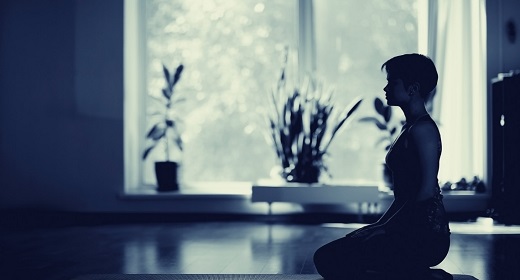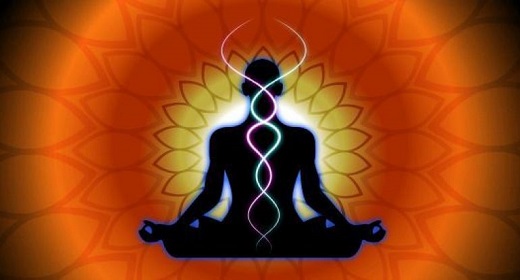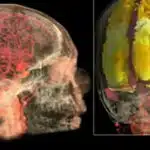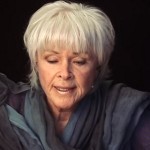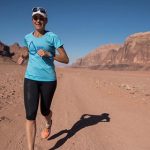Donna Quesada: Is mindfulness an act of keeping things in mind…in fullness, or is it an act of letting go and letting things out of the mind?
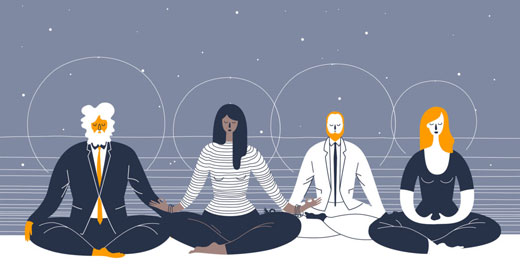
Jon Kabat-Zinn: Both. It’s what ever’s in the mind that’s held in awareness, but it’s not keeping them in, or pushing them out, or trying to get rid of them. Again, if you use the sky metaphor, and the weather metaphor… it’s the vastness of the space in the mind. It can hold any and every event, and the intrinsic space of the mind is never disturbed. Unless you generate a narrative about how angry I am, or how depressed I am. Whatever. But, you bring that into awareness without any time having to elapse. You are already free. That is the dropping in part.
Now, does that mean that you don’t have to meditate on a regular basis? No, for almost all of us, humans… we need to exercise this muscle on a regular basis. And when we do… just like exercising a regular muscle… it sometimes doesn’t feel all that well. Or, maybe you don’t want to do it, and it feels very repetitive. Maybe you could say, boring. When you actually understand the meditation process, and bring it into your life on a daily basis, and extend it in time, for a period of time, something very profound grows out of it. And that is basically the capacity to simply be… as opposed to running around all the time, trying to get to someplace better than where you already are. And the only place you are going to get by exploring that pathway, is older. But there is never a better moment than this one, now, to… as Katie would say, “do the work,” or drop in.
DONNA: Is that what happiness is?
JON: Well, I don’t know what happiness is. For myself, happiness is a sense that there is no better moment that I need to pursue. I can be in balance with this moment, whether the external conditions, if you will, are particularly wonderful or particularly awful. So, the problem with happiness is that if it’s depending on the conditions having to be just right…You can’t hold the universe under those fixed conditions, so you can be happy, all the time.
But if you cultivate flexibility, so that your awareness is big enough to hold the full catastrophe of the human condition, to coin a phrase, then your happiness in aligned with a kind of equanimity and compassion for others, that is really undisputed because it is boundless. And it’s not caught up with your personal pronouns. I, me and mine. It’s just a profound sense of well-being and deep interconnection with the world. And therefore, caring about others. And doing what you can, to help them to heal, and reconnect with the beauty that they are. And that is a love affair.
DONNA: Going back to love.
JON: Because otherwise it sounds like… That is one more boring thing I have to do with my life. Now, I’ve got to be mindful and meditate for a half hour. The fact of the matter is, there are a million doors into that room. And you don’t even have to get out of bed to cultivate a formal meditation process. You can do it in bed. What’s called in Yoga, Corpse Pose, which we use for body scan meditations, when we are lying down. But what the invitation is… Die now, get it over with. That’s why it’s called the Corpse Pose. So, when you wake up in the morning and you assume the corpse pose, lying in bed, we say… we wake up, but usually we are on auto-pilot. Our feet hit the floor… we are already anxious. We’re already late. We are already onto something else. So, before you jump out of bed in that way, maybe just drop in, as I said, into this moment. And then, dying to the past and to the future. Which means, dropping in on the present moment, in it’s fullness. And, finish the job of waking up before you get out of bed. And then carry it into the shower, and the bathroom, and see if you can be in the shower, and not in your first meeting of the morning.
DONNA: Is that your personal practice? Do you meditate every morning?
JON: I used to answer this question in various ways and the answer is yes, I do meditate every morning. But, people won’t even understand what that means. I do it in bed. I do it out of bed. I do it in the bathroom. I do it in my meditation space. I do Yoga, which is another door into it. But now, I don’t answer that question anymore because really, life itself, is the meditation practice. So, it’s not just sitting in the full lotus looking like a statue in the British museum. It’s really, reclaiming our moments. So, when you are in the shower, see if you can be in the shower. When you are with your children, see if you can be with your children. They will know if you are not fully present with them… if you are distracted or thinking about your texts, or Instagram, or anything like that. They know instantly.
DONNA: And I wanted to ask you about your personal story. We have something in common. I got interested in Zen when I was in college, when my friend lent me an Alan Watts book. And preparing for this interview, I learned that you were introduced to Zen in college, as well, but in a very important way… Philip Kapleau came to speak to your group in college?
JON: Yeah. Did you know him?
DONNA: I do not know him. But, I’m so fascinated with your experience. And, I can’t help but wonder… what did he say that captivated you?
JON: Well, it wasn’t college. It was graduate school at MIT. I was in Molecular Biology at MIT. In 1965, he came and gave a talk. I actually wrote about it in a book, that was called Coming to Our Senses. It’s in four volumes and the volume it’s in is called The Healing Power of Mindfulness. But I was walking down the halls one day, depressed out of my mind… In 1965, I was 21 years old, and I saw this sign on the wall, saying “The Three Pillars of Zen,” a talk by Philip Kapleau, At the invitation of Huston Smith, who was a professor of philosophy and religion at MIT.
I didn’t know who Huston Smith was. I didn’t know who Philip Kapleau was. And, I certainly didn’t know what Zen was. But for some mysterious reason, I went to that talk. And there were maybe three people there besides Kapleau and Huston Smith. Not a big turnout. But, that talk took the top off my head because he told this personal story about having been at journalism school at Columbia, and then was assigned to cover Nuremberg War Tribunals after the Second World War. And how devastating it was to even hear that testimony. He went off to some freezing cold monastery in the middle of winter… the northern most island of Japan… a Zen monastery… and stayed there for six weeks. And he said, all of his physical symptoms… he had ulcers and various other kinds of things… And, he was totally anxious and depressed because of the Nuremberg thing, and hearing all that testimony… it all healed. It all disappeared. And I was listening, as a 21-year-old, and saying, “this is what I’ve been looking for my whole life.” And so, I started meditating that day. And I just never stopped.
DONNA: And so, you set out to combine it with your practice in the medical profession?
JON: Not at first. At first, I was just doing it because it was a whole other domain of learning for me. And it made me feel more integrated, as a person. But then I began to feel, hey, this is powerful stuff. We should be bringing science to bear on meditation practice. Molecular Biology is very competitive at MIT, and places like that, in particular. And I began to think, all my fellow graduate students are going into Molecular Biology…What about the science of meditation?.. What about studying meditative awareness?
And of course, that was before MRI machines, or anything like that. But now, there is a confluence of deep and powerful, high class, first rate science, studying meditative awareness from a lot of different perspectives. So that’s kind of giving birth to a true renaissance that is investigating the nature of the mind, the nature of the body, and how science can inform contemplative practice. And also, contemplative practices can inform, not just science, but the mainstream world. I mean… because we are actually dying, and the planet, too, for a more mindful approach to living sanely on this planet. You know, in terms of global warming, or all of the various ways we cause harm and are not aware of it. Or, not aware enough to do something about it.
DONNA: Did you feel you had to sort of separate the practice from its Buddhist beginnings, to make it more secular, and less spiritual, or less religious?
JON: I never did feel that way, especially in the Zen Tradition. There’s a certain way in which Zen is so outrageous, that it is beyond name and form. I just believed that. I just took that at face value and said, “this isn’t about the forms or the temples or the buddha. It’s about the nature of the human mind.”
DONNA: Outrageous, for sure. I have nothing to teach!
JON: So, the answer to your question is, it just takes care of itself, so to speak, and awareness is not Buddhist. Even the Buddha wasn’t a Buddhist. He was a Buddha, which means awaken. Embodied wakefulness. And, he was teaching us, There’s nothing special about ME… Everybody has their own true Buddha nature, if you will, or true nature. And so, it’s not about adopting some foreign culture, or religious… or, whatever. It’s about reconnecting with our core humanity. Starting with the body. It’s first of Four Foundations for Mindfulness.
The first one is the body, so cultivate systematic awareness of the body. And then, learn how to live inside your own body… moment by moment. That awareness… You don’t even need the next three. Awareness is awareness. So, without even cultivating the rest of it, you are basically already there. But there are so many different refinements. There’s also thoughts and emotions, and so forth. But awareness can hold it all, as we were saying. It’s intrinsically healing… to use that kind of language. Liberating. But, you used the word secular before, and I’ve stayed away from the word secular because it’s dualistic. And one of things about this deep teaching is that it’s a non-dual teaching. It’s demonstrating that there is no separation between me and myself. Or, self and other.
So, all these artificial distinctions… but they blur over how there’s this whole unity of life, that we all have the same DNA. All humans on the planet are 99.7% the same, genetically. And yet, we kill each other over those .03% differences, and don’t respect the different manifestations of humanity… not realizing that is you, too. And the same for the Earth. So, from that point of view, this is really a non-dual practice, that’s not about getting anywhere else, as we were saying, but actually being where you already are. And realizing that is not just an ordinary experience. Our capacity to be where we already are is extraordinary… because again, like I was saying, the eyes see, the ears hear, the nose smells. I mean, there is nothing ordinary about any of this, until we lose it. Then it’s “Oh My God! I didn’t realize what I had!” Well, wake up and realize it while you have the chance! And then live that way, moment by moment, trusting yourself; not some guru… not some high spiritual being.
I try to stay away from the word spiritual, altogether… because in many ways, it’s kind of airy fairy, and divisive, and everybody sort of thinks my spiritual practice is of course, the best spiritual practice, which isn’t very spiritual. So, instead of using the word secular…because as soon as you do that you have the secular on one hand and the sacred on the other…I don’t want to separate it.
The work we do in the hospital is sacred work. So, we never say that we are doing “secular mindfulness.” That’s absurd. Because it has to cover the whole gamut of human experience. It’s an impossibility. So, I use the term “mainstream.” We are just bringing mindfulness into the mainstream. Out of the monasteries. Out of the various traditions from which it was birthed, nurtured, gestated, for thousands of years. And now, as you were saying in your introduction, it’s out there in a big way. I’m not sure it’s always expressed in the most articulate way, that really understands what it is. And there is a lot of hype around it, but that’s just part of the price you pay for something becoming part of the mainstream. But there are so many people out there, who understand this in a deep way, and are living it in a deep way, and studying it in a deep way… writing about it in a deep way and offering it in every conceivable area of human activity. In a more or less deep way, for now, that it has the potential to evolve into something, that from my perspective, is necessary for the evolution of humans on the planet. I think we really have to wake up collectively on this planet. We don’t have that much time to do it. So, it’s not a luxury at this point in time, or an airy-fairy luxury. It’s a necessity.
DONNA: And how do we do that? How do we balance this business of personal awakening with our commitment as a community… a global community?
JON: Any way we can and anywhere we can. I don’t have a narrow prescription for it. But we need a mindful politics. We need a mindful economics. We need mindfulness with a social and social activist level. Where it’s not driven by self-interest… it’s not driven by ego. Even if you win, you lose in a certain way because you are othering all those people that don’t agree with you. And basically, creating this dualistic separation that we can’t afford to do anymore because… Look at the country. It’s split up the middle. And often, people can’t talk to members of their own family about Trump, or about politics because people are so angry. They get in their foxholes, or silos, and everybody is falling into self-righteousness. And there is something wrong with that picture.
DONNA: What is that something? Is there too much ego?
JON: It’s mindfulness. It’s heart-fulness. And a sort empathic, compassionate understanding that… when people are frightened… when they feel disregarded… they will fall into this kind of fear state, where they will lose their own humanity, and try to protect themselves from the other. Immigration. Immigrants taking over everything. We’ve just seen this all over the planet. The counterforce to that kind of…. I don’t know what to call it… Populism, that we see… it’s really about protecting ourselves from these forces of globalism and everything. And there are many good reasons that we do have, to protect ourselves from these kinds of forces. But from the perspective of the planetary level… the species level… we need to wake up to who we, ourselves, are. Because we may be protecting ourselves in a small way, and lose ourselves, and our integrity, and our ethics, and our morality, in a very big way… and cause unthinkable amounts of harm.
DONNA: Do you think there is reason for hope?
JON: Is it making any sense to you, what I’m saying?
DONNA: Yes, it is.
JON: Because it’s hard to implement, of course. But we gave ourselves the name Homo Sapiens, as a species, which really means, the species that is aware, and knows that it’s aware. It’s not just cognition and meta-cognition. It’s awareness and meta-awareness. Now, we haven’t really lived our way fully into that. So, I think, you started out asking about wakefulness. That’s ultimately going to be absolutely necessary, if we are going to find our way out of this kind of dualistic dilemma, and the harm that we are causing. A sense of interconnectedness and possibility.
DONNA: Is it also dualistic to ponder the roots of this disharmony that we face? The global problems? For instance, is there an imbalance of masculine vs feminine energy on this planet, and could you speak to that, a little bit?
JON: I don’t know about an imbalance, but there’s a disregard of enormous proportions, for the miracle of feminine energy, since all of us come out of women’s bodies, so far, with very few exceptions. But dystopic scenarios… that may become a thing of the past. I don’t know. I don’t really want to say those words. They make movies about that kind of stuff. But no, obviously, the miracle of life comes out of the bodies of women. When a being is born, it’s a completely integrated whole human being. Trillions of cells, all with the capacity… and babies, when they are born, are not finished. I mean, they need years, and years, and years, to come online, so to speak… to develop a brain, and a nervous system, and to learn, and to grow.
So, there is such a miraculous element to this thing called “life.” Mothers, of course, know that. Unfortunately, too often we forget. So yes, there are elements of mindlessness revolving around gender. Mindlessness revolving around culture, of all kinds. Our capacity for othering, and disregard, and bias, and for legalizing injustice, is just colossal. And, the whole history of the United States is legalizing injustice. There was emancipation of slaves, but after a few decades of reconstruction, the Southern States implemented laws that basically pushed black people back into servitude and prison, in huge numbers, when the promise was there, and basically never fulfilled.
And now, we are wrestling with the consequences, to say nothing about the genocide during the founding of the country. Now we need to swallow that. We need to own that because you can’t move beyond it until in some sense, you digest it. So, there are a lot of things like that. Not just in the U.S., but all over the world… where the Chinese are imprisoning millions of Muslims in their country, and creating concentration camps, based on surveillance equipment that comes from the United States.
So, mindfulness has to be inclusive of all these kinds of issues. Including, we can take satellite pictures of the polar regions, and the glaciers all over the world… You see, over the last 50 years, glaciers diminishing. Virtually no glaciers. You know what those glaciers are called? Fresh water. And when it goes into the sea, it’s no longer fresh water. That fresh water took a zillion eons to accumulate in Greenland, and the North Pole, and Antarctica. And, if it ends up in the ocean, in the next 40 years, not only will all our coastal cities be underwater, but there won’t be any water for us to drink. Technological fixes may help us in some ways, but what we need is a human fix.
Read and Watch Part III Here: Awaken Interviews Jon Kabat-Zinn Pt 3 – Restoring Natural Balance
Read and Watch Part I Here: Awaken Interviews Jon Kabat-Zinn Pt 1– Non Judgment Of The Present Moment








